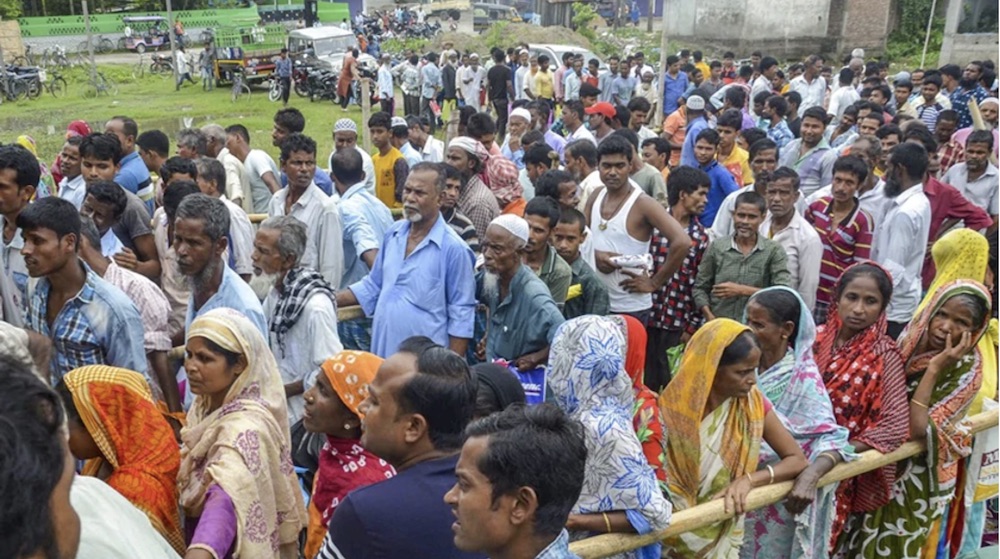Muslim migrants fear detention under Modi’s Hindu agenda

(The New York Times) – More than four million people in India, mostly Muslims, are at risk of being declared foreign migrants as the government pushes a hard-line Hindu nationalist agenda that has challenged the country’s pluralist traditions and aims to redefine what it means to be Indian.
The hunt for migrants is unfolding in Assam, a poor, hilly state near the borders with Myanmar and Bangladesh. Many of the people whose citizenship is now being questioned were born in India and have enjoyed all the rights of citizens, such as voting in elections.
State authorities are rapidly expanding foreigner tribunals and planning to build huge new detention camps. Hundreds of people have been arrested on suspicion of being a foreign migrant — including a Muslim veteran of the Indian Army. Local activists and lawyers say the pain of being left off a preliminary list of citizens and the prospect of being thrown into jail have driven dozens to suicide.
But the governing party of Prime Minister Narendra Modi is not backing down.
Instead, it is vowing to bring this campaign to force people to prove they are citizens to other parts of India, part of a far-reaching Hindu nationalist program fueled by Mr. Modi’s sweeping re-election victory in May and his stratospheric popularity.
Members of India’s Muslim minority are growing more fearful by the day. Assam’s anxiously watched documentation of citizenship — a drive that began years ago and is scheduled to wrap up on Aug. 31 — coincides with another setback for Muslims, this one transpiring more than a thousand miles away.
Less than two weeks ago, Mr. Modi unilaterally wiped out the statehood of India’s only Muslim-majority state, Jammu and Kashmir, removing its special autonomy and turning it into a federal territory without any consultation with local leaders — many of whom have since been arrested.

Among Mr. Modi’s critics, events in Assam and Kashmir are Exhibits A and B in their conviction that the prime minister is using the early months of his second term to push the most forceful and divisive Hindu nationalist agenda ever attempted in India and to fundamentally reconfigure the concept of Indian identity to be synonymous with being Hindu. Many Indians, on both sides of the political divide, see Assam and Kashmir as harbingers of the direction Mr. Modi will take this nation of 1.3 billion people in the coming years.
The stated purpose of the citizenship dragnet in Assam is to find undocumented immigrants from Bangladesh — a predominantly Muslim country to its south. Amit Shah, India’s powerful home minister, has repeatedly referred to those immigrants as “termites.’’
All of the 33 million residents of Assam have had to prove, with documentary evidence, that they or their ancestors were Indian citizens before early 1971, when Bangladesh was established after breaking away from Pakistan. That is not easy. Many families are racing to get their hands on a decades-old property deed or fraying birth certificate with an ancestor’s name on it.
Beyond this, Mr. Modi’s government has tried to pass a bill in Parliament that carves out exemptions for Hindus, Buddhists, Christians and people from other religions — but leaves out Muslims.
Mr. Modi’s critics say he is playing a dangerous game and pulling apart the diverse, delicate social fabric that has existed in India for centuries.
The prime minister’s political roots lie in a Hindu nationalist movement that emphasizes the religion’s supremacy. This worldview has a long history of sowing division between the country’s Hindu majority and Muslim minority, at times exploding in violence.
Assam has been hit by its own troubles and ethnic bloodshed. But the violence being reported now is self-inflicted.

Noor Begum, who lived in a small hamlet in a flood-soaked district, spiraled into depression after finding out that she and her mother had been excluded from the citizenship lists. Her father and seven siblings had made it.
It didn’t make any sense to the family: Why, if they all lived together and were born in the same place, would some be considered Indian while others illegal foreigners?
“Of course she was Indian,” said her father, Abdul Kalam, a retired laborer. “She used to sing Indian national songs at school. She felt very Indian.”
On a bright morning in June, Noor hanged herself from a rafter. She was 14.
Many Muslims in Kashmir are despondent as well. After Mr. Modi’s government erased Kashmir’s autonomy, thousands of outraged Kashmiris took to the streets, only to be locked down by a heavy deployment of security forces and a smothering communications blackout.
Kashmir has long been a flash point. Both India and Pakistan control different parts of it and several times, the tensions have driven the two nuclear armed rivals to war or dangerously close to it.
Though the Indian government has eased some of the communication restrictions in the past few days, hundreds of Kashmiri intellectuals are still under arrest and Pakistan is seething.
The tension with Pakistan tends to lift Mr. Modi’s political fortunes. His forceful stand against India’s No. 1 enemy just adds to his image as an unswerving patriot and one of the most decisive and powerful prime ministers India has produced in decades.
Many in India’s Hindu majority don’t object to Mr. Modi’s Hindu nationalist policies or even seem to think too much about them. They praise what they see as the strides he has made in fighting poverty and projecting a more muscular image of India on the world stage.

